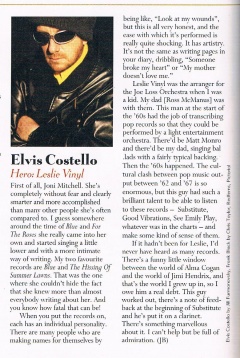Mojo, March 2002: Difference between revisions
(start page) |
(+text) |
||
| Line 10: | Line 10: | ||
{{Bibliography text}} | {{Bibliography text}} | ||
First of all, [[Joni Mitchell]]. She's completely without fear and clearly smarter and more accomplished than many other people she's often compared to. I guess somewhere around the time of ''Blue'' and ''For The Roses'' she really came into her own and started singing a little lower and with a more intimate way of wilting. My two favourite records are ''Blue'' and ''The Hissing Of Summer Lawns''. That was the one where she couldn't hide the fact that she knew more than almost everybody writing about her. And you know how fatal that can be! | |||
When you put the records on, each has an individual personality. There are many people who are making names for themselves by being like, "Look at my wounds", but this is all very honest, and the ease with which it's performed is really quite shocking. It has artistry. It's not the same as writing pages in your diary, dribbling, "Someone broke my heart" or "My mother doesn't love me." | |||
Leslie Vinyl was the arranger for the Joe Loss orchestra when I was a kid. My dad [Ross McManus] was with them. This man at the start of the '60s had the job of transcribing pop records so that they could be performed by a light entertainment orchestra. There'd be Matt Monro and there'd be my dad, singing ballads with a fairly typical backing. Then the '60s happened. The cultural clash between pop music output between '62 and '67 is so enormous, but this guy had such a brilliant talent to be able to listen to these records — "Substitute," "Good Vibrations," "See Emily Play," whatever was in the charts — and make some kind of sense of them. | |||
If it hadn't been for Leslie, I'd never have heard as many records. There's a funny little window between the world of Alma Cogan and the world of Jimi Hendrix, and that's the world I grew up in, so I owe him a real debt. This guy worked out, there's a note of feedback at the beginning of "Substitute" and he's put it on a clarinet. There's something marvellous about it. I can't help but be full of admiration. | |||
{{cx}} | {{cx}} | ||
| Line 20: | Line 25: | ||
'''Mojo, No. 100, March 2002 | '''Mojo, No. 100, March 2002 | ||
---- | ---- | ||
Elvis Costello writes about Leslie Vinyl. | Elvis Costello writes about [[Joni Mitchell]] and Leslie Vinyl. | ||
{{Bibliography images}} | {{Bibliography images}} | ||
| Line 45: | Line 50: | ||
[[Category:Magazine articles|Mojo 2002-03-00]] | [[Category:Magazine articles|Mojo 2002-03-00]] | ||
[[Category:Elvis writes|Mojo 2002-03-00]] | [[Category:Elvis writes|Mojo 2002-03-00]] | ||
Revision as of 20:26, 22 July 2013
|


